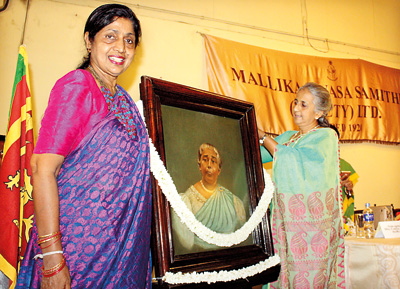News
A child untouched by love is unguarded by law
Widespread ignorance about the psychological and emotional wellbeing of children nullifies any number of laws designed to protect the young from misery and abuse, one of the country’s leading child protection authorities said.

Dr. Charika Marasinghe (right) garlands the portrait of Mallika Hewavitarne, while President of the Mallika Nivasa Samithiya (Society) Damayanthi de Alwis Fernando (left) looks on. Pic by Nilan Maligaspe
Even in safe and loving homes, such ignorance can stultify a child’s cognitive development, said Dr. Charika Marasinghe, whose pioneering work in child psychology and mindfulness in child protection is based on institutionalised children who have undergone traumas in life.
Dr. Marasinghe points out that it is crucial that caregivers understand that even without abuse, normal adolescence and childhood are challenging for a child; it was the responsibility of adults to make positive interventions at crucial stages of child development.
Mindful parenting focuses on how to connect with children through all senses by giving full attention and strongly grounding in the present moment.
“If children are exposed to an enriching environment with wholesome experiences their minds will flourish,” she said. “Caregivers should understand children, respond to them, should maintain positive interaction, not only verbal but also through facial expressions and body language.”
After decades of experience in law and children’s rights, Dr. Marasinghe, an attorney-at-law, former law lecturer at the University of Colombo, founder of Sarvodaya’s legal aid unit and member of the National Child Protection Authority, realised that laws have no effect on understanding the real issues regarding the care and protection of children.
She turned her mind to researching the disciplines of neuro-scientific literature, cellular biology, neurobiology and psychology for answers.
“Neurologists have discovered that billions of brain neurons of the foetus could be stimulated through effective communication between parents and the baby,” Dr. Marasinghe said.
“Also, they say that the human brain is fully forged (amygdala and prefrontal cortex) only at the age of 25.”
Such facts can guide parents, caregivers and others in shaping and mending the minds and hearts of young people, Dr. Marasinghe said.
“The identification of the human brain mechanism can address issues of emotional and social aggressive behaviour of children.”
Children who are exposed to abuse and violence at a young age cannot comprehend what really happened to them, Dr, Marasinghe said. Trauma specialists defined the phenomena as “the body keeps the score”. A child’s body retains the memory of the sexual or physical abuse and becomes startled at the smallest kind of trigger as the body imagines a danger.
Dr. Marasinghe looked at the concept of Mindfulness-Based Stress Reduction (MBSR), founded by Professor Jon Kabat-Zinn at the University of Massachusetts in the United States.
The practice is inspired by the four contemplations of mindfulness in Buddhism: mindfulness of the body, feelings, thoughts and the reality of life.
Dr. Marasinghe pioneered adapting and modifying Western MBSR in a way that suits Sri Lankan culture by applying the practice towards child protection. The practice stands apart from the conventional Theravada Buddhist practice of mindfulness.
“Mindfulness in child protection should be handled with extreme caution. If the process is done wrongly, children can go through re-traumatisation,” Dr. Marasinghe explained.
If a child denied and refused to acknowledge inner pain, the child was not healed and carried the trauma to adulthood, often continuing a cycle of violence.
Victimised children are usually full of resentment, hatred and guilt as perpetrators use trust and power against them while instilling guilt in their minds, Dr. Marasinghe said.
Deviating from the traditional MBSR, she introduced a way of befriending one’s body and expressing self-gratitude. “Being thankful to the capabilities of life, body functions and positive affirmation adopted through loving kindness are simple exercises that could be taught to children,” she said.
Dr. Marasinghe, who works as a consultant in human rights, child rights, child protection and institutional development and as a Mindfulness Programme developer and trainer, has, through her work, also come to understand the challenges for caregivers who struggle with their own problems.
“The most common situation in Sri Lanka is that women who apply for the posts of caregivers in institutions have passed the marriageable age,” she explained. “They come to children seeking love and affection.
“These children, on the other hand, are deprived of love from birth and don’t know how to show affection. A clash occurs where both parties seek attention on different levels.”
Dr. Marasinghe’s ideas on child psychology and cognitive development were expressed during her keynote address as chief guest at the 98th annual general meeting of the Mallika Nivasa Samithiya (Society) on Wednesday at Mallika Nivasaya, Bambalapitiya.
Founded in 1920 by Mallika Hewavitarne, mother of Anagarika Dharmapala, with the vision of “Lending a hand to those in need”, the Mallika Nivasaya serves destitute elderly women and children by providing them shelter and protection.
Embarking on its centenary celebrations next year, Mallika Nivasaya looks forward to continuing its mission of serving the helpless and needy.

